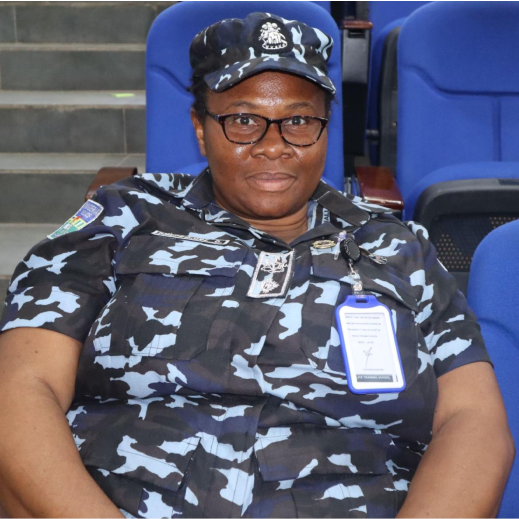To ensure national ownership of the police reform, UNDP held two
consultations with 120 Commissioners of Police Divisions and
Commandants of the police training institutions. A plan of action
was developed detailing actions required of the Commissioners and
Commandants in furthering the reform process.
Through a communications campaign led by UNDP, 4,500 people became
more informed about the police reform process. With UNDP’s
support, the NPF distributed 4,200 copies of the 2020 Police Act,
2,000 copies of the Police Reform Roadmap, and over 4,000 copies
of the frequently asked questions (FAQ) sheets on the reform
process in four languages. To further broaden the outreach, UNDP
coordinated a two-day roundtable with the key stakeholders in the
police reform process to align actions and to agree on the
monitoring, evaluation and learning (MEL) approach to measuring
the impact of the reform spearheaded by the Police Reform and
Transformation Office (PORTO).
Following the assessment of police training colleges, UNDP
coordinated the renovations and equipped the training facilities
of the Central Planning Training Unit (CPTU) in Jos. In addition,
PORTO initiated discussions with the Police Trust Fund to
facilitate rehabilitation of the police training schools. As a
result, facilities were rehabilitated in training schools in
Maiduguri and Enugu, where UNDP provided learning materials.
Additionally, UNDP supported legislative developments in the House
of Assembly to grant the colleges a legal identity that would
ensure budget allocations to maintain their functionality.
UNDP secured funding from the German Federal Foreign Ministry to
acquire 250 military-grade tents and mobile field-deployment
equipment. The provision of this equipment enhanced the NPF’s
ability to deploy to conflict hotspots swiftly and contributed to
boosting the morale of police officers.
To ensure that human rights are respected and upheld within the
NPF, UNDP partnered with the Office of the High Commissioner for
Human Rights (OHCHR) to provide training for 40 police legal
officers (including seven women). The training aimed to integrate
human rights considerations into policing procedures, in line with
section 66 of the Police Act. This section mandates that legal
officers act as human rights focal points within the NPF at both
the command and divisional levels.
GENDER EQUALITY
UNDP continued collaborating with UN Women to further advocate for
the adoption of the Gender Policy for the Nigerian police. While
the policy was publicly validated by the NPF senior management, it
needs to be officially approved and adopted. The policy is set to
have a substantial impact on gender equality within the police,
ensuring equal access to opportunities, resources and rights for
women, men and other gender identities in the Nigeria Police
Force.
Additionally, UNDP enhanced the leadership capacity of 60
mid-ranked women police officers with a focus on inclusivity and
gender equality. The training adopted 360-degree feedback
mechanisms for a holistic evaluation of leadership effectiveness.
In agreement with the NPF, UNDP is working towards identifying
and prioritising women officers for leadership positions. In
2023, five women were promoted to senior ranks, representing a
significant shift from previous practices. Only eight percent of
the Nigerian police staff are women, with the majority in junior
clerical posts. UNDP plans to transform this situation by
supporting a change management process and organising training
sessions targeting women police officers at all ranks of the
NPF.
BUSINESS AND HUMAN RIGHTS
In 2023, Nigeria achieved a significant milestone, becoming
Africa's third country to develop a National Action Plan on
Business and Human Rights (NAP). UNDP partnered with the NHRC to
support a high-level engagement that brought together national and
international actors, including government and non-governmental
organisations, active on business and human rights (B+HR) in
Nigeria. The engagement culminated in the inauguration of the
National Working Group on B+HR that will pursue policy
development, engage in advocacy and capacity building. UNDP
Nigeria also provided financial support to the NHRI to set up a
secretariat for the working group, developed a protocol for the
secretariat and printed limited copies of the NAP. In addition, in
partnership with the NHRI and other stakeholders, UNDP crafted a
concept note to operationalise the NAP.



